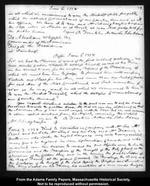June 6. 1778
in all which we recommend to you, the strictest possible frugality, which the distasteful Circumstances of our Country, demand of all of her officers. We leave it to you and Mr.Schweighauser to repair the ship either at Nantes or Brest, as you shall judge best for the public service.
Signed by B. Franklin, Arthur Lee, John Adams.
To Abraham Whipple Esq. Commander of the American Frigate the Providence at Painbeuf.
Passi June 6. 1778
Sir
We had the Pleasure of yours of the first instant, Yesterday. We have directed Captain Whipple to address himself, as well as his Prize on her Arrival to you, for the necessary Repairs of the Providence, of which We must leave him to judge, to furnish him with necessary Victuals and Slops for his Men, not more than one Suit of Cloaths for each Man of the Ships Compliment, and such munition of War as he may want, in all which We recommend to him and to you the strictest Frugality, which the distressed Circumstances of our Country demand.
You request directions relative to the part you are to act, on such Occasions towards the Custom House. All that We can say, at present, is, that the American Men of War must comply with the Laws: but We will endeavour to obtain explicit directions from his Majesty, concerning this Subject.
We are &c.
B. Franklin, Arthur Lee, John Adams.
Mr. Schweighauser.
Page a1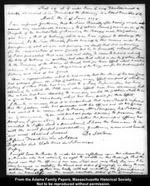
Sheet 29. At + under June 6, 1778. This Letter must be inserted. We received it in French: but the following is a litteral translation of it.
[The following letter and the above comment were copied by John Adams on a separate leaf and keyed by a cross for insertion ahead of the entry dated 7 June.] Marli the 6. of June 1788
I am informed Gentlemen, that the Sieur Bersolle, after having madeadvances very considerable Advances to Captain Jones, Commander of the Frigate of the United States of America, the Ranger, made this Captain give him a Bill of Exchange, which you have refused to discharge the Amount. As the Sieur Bersolle finds himself by this means under Embarrassment, and as you will perceive, no doubt, that it is interesting for the conservation of your Credit, that he be promptly relieved from it, I am persuaded that you will not delay, to cause to be paid not only the Bill of Exchange in question, but also that which is due by Captain Jones to the Treasury of the Marine at Brest, both for those Effects which have been delivered to him, from the Magazines of the King, and for his personal Subsistence, and that of his Crew.
Upon a representation which he has made, that the Men of his own Crew had pillaged from the Ship Chatham, many Effects, one part of which consisting of Silver Plate, had been sold to a Jew, Information has been obtained, by which the Plate and other Effects have been discovered; but the whole has been deposited, to remain, untill the Captain shall be in a Condition to reimburse what has been paid for these Effects.
I think, moreover, that it is important that you should be informed that this Captain who has quarrelled with his Officers and all his Crew has caused to be committed to Prison, Mr. Simpson, his second in Command. You will perhaps judge it proper, to procure the necessary Information, to know whether this principal Officer has merited to suffer such a punishment. I have the honnour to be with the most perfect Consideration, Gentlemen, your most humble and most obedient Servant
De Sartine.
Messieurs Franklin, Lee et Adams Deputes des Etats Unis de L'Amerique
Passy.
I might leave the Reader to make his own reflections upon this interposition of a Minister who had certainly no right to meddle in this Business. But the Secret was that the Officers of our own Ships and every Body else, were to be countenanced in violating the Laws and Orders of Congress, in doing the most arbitrary Things of their own heads, without consulting the Commissioners, and in trampling on the most equitable orders of the Commissioners
Page a2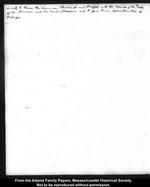
merely to throw the American Business and Profits into the hands of the Tools of the Minister and his Understrappers and to give them Opportunities of Pillage.
June 7. 1778.
Went to Versailles in Company with Mr. Lee, Mr. Izard and his Lady, Mr. Lloyd and his Lady and Mr. Francis
[Franc s], a Gentleman who spoke the English Language very well, having resided many Years in England in some diplomatique Character, and who undertook upon this Occasion to conduct Us. Our Objects were to see the Ceremonies and the Procession of the Knights of the Holy Ghost, or the Chevaliers of the Cordon blue, and in the Evening the public Supper of the Royal Family at the grand Couvert. The Kneelings, the Bows, and the Curtesies of the Knights of the Saint Esprit, the Dresses and Decorations, The King seated on his Throne, his investiture of a new created Knight
Page 2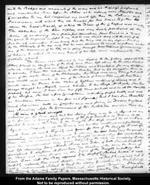
with the Badges and Ornaments of the Order, and his Majesty's profound and reverential Bow before the Altar as he retired, were Novelties and Curiosities to me, but
surprized me much less, than the Patience and Perseverance with which they all kneeled for two hours together upon the hard Marble, of which the Floor of the Chapel was made. The distinction of the blue ribbon, was very dearly purchased at the price of enduring this painful Operation, four times in a Year. The Count De Vergennes confessed to me, that he was almost dead, with the pain of it. And the only insinuation I ever heard, that the King was in any degree touched by the Philosophy of the Age was, that he never discovered so much impatience under any of the Occurrences of his Life, as in going through those tedious Ceremonies of Religion to which so many hours of his Life were condemned by the Catholic Church.
The Queen was attended by her Ladies to the Gallery opposite to the Altar, placed in the Center of the Seat, and there left alone by the other Ladies, who all retired. She was an Object too sublime and beautiful for my dull pen to describe. I leave this
Enterprize to Mr. Burke. But in his description there is more of the orator than of the Philosopher. Her Dress was every Thing that Art and Wealth could make it. One of the Maids of honor told me, she had Diamonds upon her Person to the Value of Eighteen millions of Livres, and I always thought her Majesty much beholden to her Dress. Mr. Burke saw her probably but once. I have seen her fifty times perhaps and in all the Varieties of her Dresses. She had a fine Complexion indicating perfect health, and was an handsome Woman in her face and figure. But I have seen Beauties much
superiour both in Countenance and form, in France, England and America. After the Ceremonies of this Institution are over there is a
At nine o'clock at night collection for the Poor and that this closing Scene may be as elegant as any of the former, a young Lady of some of the first Families in France is appointed to present the Box to the Knights. Her dress must be as rich and elegant in Proportion as the Queens, and her Air, motions and Curtesies must have as much Dignity and Grace as those of the Knights. It was a
amusing curious Entertainment to observe the
air Easy Air, the graceful Bow and the conscious Dignity of the Knight in presenting his contribution, and the correspondent Ease, Grace and Dignity of the Lady in receiving it were not less charming. Every Muscle, Nerve and
Fibre of both seemed perfectly disciplined to perform its functions. The Elevation of the Arm, the bend of the Elbow and every finger in the hand of the Knight, in putting his Louis Door
[d'Or] into the Box, appeared to be perfectly studied because it was perfectly natural. How much devotion there was in all this I know not, but it was a consummate School to teach the rising Generation the Perfection of the French Air and external Politeness and good Breeding. I have seen nothing to be compared to it, in any other Country. The House of Lords
Page 3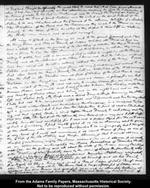
in England I thought
the assembly the most likely to rival this: But seven Years afterwards when I had seen that Assembly on two extraordinary Occasions, the first the Introduction of the Prince of Wales to his Seat in Parliament and the second the
Tryal of Mr. Hastings, I concluded the Peers of Great Britain were too intent on the great Interests of the Nation, to be very solicitous about the Charms of the exteriour Exhibition of a Spectacle. The Procession of the Peers and the Reverences they made to the Throne in conformity to the Usage of their Ancestors, as they passed to their Seats in Westminster Hall, were decent and graceful enough.
At nine O Clock in the Evening We went to the grand Couvert, and saw the King, Queen and Royal Family at Supper. Whether Mr. Francis had contrived a plott to gratify the Curiosity of the Spectators, or whether the Royal Family had a fancy to see the
new raw American at their leisure, or whether they were willing to gratify him with a convenient Seat, in which he might see all the Royal Family and all the Splendors of the Place, I know not. But the Scheme could not have been carried into Execution certainly without the orders of the King. I was selected and summoned indeed from all my Company, and ordered to a Seat close beside the Royal Family. The Seats on both Sides of the Hall, arranged like the Seats in a Theater, were all full of Ladies of the first Rank and Fashion in the Kingdom and there was no room or place for me but in the midst of them. It was not easy to make room for one more Person. However Room was made and I was situated between two Ladies, with Rows and Ranks of Ladies above and below me, and on the right hand and on the left hand Ladies only. My Dress was a decent French Dress, becoming the Station I held, but not to be compared with
[the] Gold and Diamonds and Embroidery about me. I could neither speak nor understand the Language in a manner to support a Conversation: but I had soon the Satisfaction to find it was a silent Meeting, and that nobody spoke a Word but the Royal Family to each other, and they said very little. The Eyes of all the Assembly were turned upon me, and I felt sufficiently humble and mortified, for I was not a proper Object for the criticisms of such a Company. I
[found] a myself gazed at, as We in America used to gaze at the Sachems who came to make Speeches to Us in Congress, but I thought it very hard if I could not command as much Power of face, as one of the Chiefs of the Six Nations, and therefore determined that I would assume a
chearful Countenance, enjoy the Scene around me and observe it as coolly as an Astronomer contemplates the
Starrs. Inscriptions of Fructus Belli were seen on the Ceiling and all about the Walls of the Room among Paintings of the Trophies of War, probably done by the order of Louis the fourteenth, who confessed in his dying Hour as his Successor and Exemplar Napoleone will probably do,
that he had been too fond of War. The King was the Royal Carver for himself and all his Family. His Majesty eat like a King and made a Royal Supper of solid Beef and other Things in Proportion. The Queen took a large spoonful of
Soupe, and displayed her fine Person and graceful manners, in alternately looking at the Company in various parts of the Hall, and ordering several kinds of
Page 4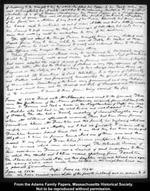
Seasoning to be brought to her, by which she fitted her Supper to her Taste. When this was accomplished, her Majesty exhibited to the admiring Spectators, the magnificent Spectacle of a great Queen swallowing her Royal Supper in a single Spoonful, all at once. This was all performed like perfect Clockwork, not a feature of her face, nor a Motion of any part of her Person, especially her Arm and her hand could be criticised as out of order. A little and but a little Conversation seemed to pass among the Royal Personages of both Sexes, but in so low a voice that nothing could be understood by any of the Audience.
The Officers about the Kings Person brought him many Letters and Papers from time to time, while he was at Table. He looked at these, some of them he read or seemed to read, and returned them to the same Officers who brought them or some others.
These Ceremonies and Shows may be condemned by Philosophy and ridiculed by Commedy, with great reason. Yet the common Sense of Mankind has never adopted the rigid decrees of the former, nor ever sincerely laughed with the latter. Nor has the Religion of Nations in any Age, approved of the Dogmas or the Satyrs. On the Contrary it has always overborne them all and carried its Inventions of such Exhibitions to a degree of Sublimity and Pathos which has frequently transported the greatest Infidels out of themselves. Something of the kind every Government and every Religion has and must have: and the Business and Duty of Lawgivers and Philosophers is to endeavour to prevent them from being carried too far.
June 8. 1778.
Dined with Mr. Alexander, and went to the Concert. There were two Gentlemen of the Name of Alexander, originally from Scotland, who came to France and took a house in the Neighbourhood of Passi. One was a Bachelor who had lived in the West Indies and was supposed to be a Man of Property. The other had a Family consisting of several Daughters one of whom Mr. Williams afterwards married. There had been some former Connections between Mr. Franklin and this family in England, which was carefully concealed as a Mystery and I had no Curiosity to enquire into it.Franklin however several times said to me that they had been under great Obligations to him in former times. And one of them now and then dropped to me, some of Franklins former confessions to him, concerning his Amours which were curious enough. The Ostensible Purpose of their residence in France was a Lawsuit of great importance to them in which they expected and I believe received Assistance from Franklin. The Alexanders were sensible Men, and their daughters were well behaved and agreable young Ladies, which made their Situation in the neighbourhood a pleasant Circumstance.
June 10. 1778
Passi June 10. 1778
Sir
We have received your Letter of the fourth instant, and in answer to it

